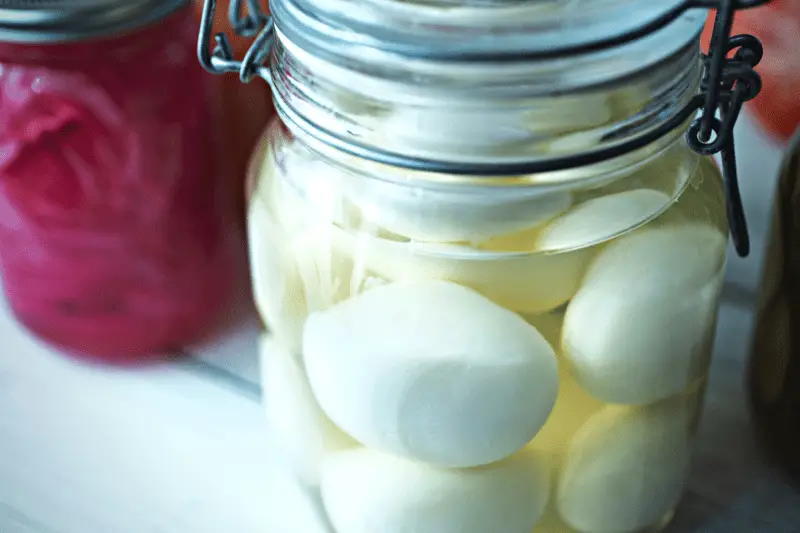Pickled eggs are a popular snack and a great addition to salads, sandwiches, or as a side dish.
They are easy to make and can be customized to suit your taste.
Pickling is a method of preserving food that involves immersing it in vinegar and salt solution.
In this article, we will guide you through the process of pickling eggs at home.

Ingredients and Equipment
Before you start pickling, you need to gather all the necessary ingredients and equipment.
Ingredients
- Eggs
- White Vinegar
- Water
- Salt
- Sugar
- Spices (optional)
Equipment
- Large pot
- Glass jar with a lid
- Slotted spoon
- Funnel
Preparation
Before pickling, it is essential to clean and sterilize your jar and utensils. Wash the jar and lid with hot soapy water and rinse them thoroughly. Next, sterilize them by placing them in a pot of boiling water for at least 10 minutes.
Hard Boiling the Eggs
The first step in pickling eggs is to hard-boil them. This is done by placing the eggs in a pot of cold water and bringing it to a boil.
Once the water starts boiling, turn off the heat and let the eggs sit for 10-12 minutes. After that, remove the eggs from the hot water and immediately place them in a bowl of ice water to stop the cooking process.
Making the Pickling Solution
The pickling solution is a combination of vinegar, water, salt, sugar, and spices (if desired).
To make the pickling solution, combine 2 cups of white vinegar, 2 cups of water, 1 tablespoon of salt, and 1 tablespoon of sugar in a pot. Bring the mixture to a boil and let it simmer for 5-10 minutes.
You can add spices like black peppercorns, bay leaves, or red pepper flakes to the mixture to add flavor.
Pickling the Eggs
Once the eggs are hard-boiled and the pickling solution is ready, it’s time to pickle the eggs.
Peel the eggs and place them in the sterilized jar. Pour the pickling solution over the eggs, making sure they are completely covered.
If you added spices, place them in the jar as well. Use a slotted spoon to remove any air bubbles and ensure that the eggs are fully submerged in the pickling solution.
Storing the Pickled Eggs
After pickling, store the jar in the refrigerator for at least 24 hours before serving. Pickled eggs can be stored in the refrigerator for up to 3 months.
Serving Suggestions
Pickled eggs can be enjoyed as a snack or used as a topping for salads or sandwiches. They can also be chopped and used in egg salad or deviled eggs.
Tips and Tricks
- Use fresh eggs for pickling. Older eggs are more difficult to peel and may result in an unappealing appearance.
- Experiment with different spices and flavorings to customize the taste of your pickled eggs.
- For a milder flavor, use apple cider vinegar instead of white vinegar.
Safety Precautions
- Always wash your hands and utensils thoroughly before and after handling eggs.
- Keep the pickled eggs refrigerated at
- Keep the pickled eggs refrigerated at all times.
- Do not consume pickled eggs that have been left at room temperature for more than two hours.
Frequently Asked Questions (FAQs)
1. Can I use brown eggs for pickling?
Yes, you can use brown eggs for pickling. However, the color of the eggshell may affect the appearance of the pickled egg.
2. Can I reuse the pickling solution?
No, it is not recommended to reuse the pickling solution as it may contain bacteria from the eggs.
3. Can I pickle eggs without vinegar?
No, vinegar is an essential ingredient in pickling eggs as it helps to preserve them and gives them their distinctive tangy flavor.
4. How long do pickled eggs last?
Pickled eggs can be stored in the refrigerator for up to three months.
5. How do I know if the pickled eggs have gone bad?
If the pickled eggs have a foul smell or taste, or if the pickling solution appears cloudy or discolored, then the eggs may have gone bad and should be discarded.
Conclusion
Pickling your own eggs is an easy and fun way to create a tasty and nutritious snack.
By following the steps outlined in this article, you can create delicious and customized pickled eggs that will impress your family and friends.
Remember to follow proper safety precautions and store your pickled eggs in the refrigerator at all times. Enjoy!
